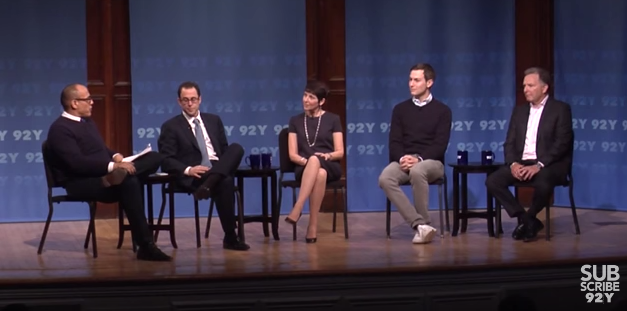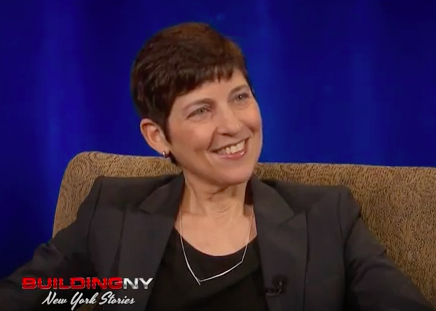Inspiration March 31, 2017


In a field where women represent only 38 percent of professionals, Abby Hamlin and her firm, Hamlin Ventures, have sparked a revolution in New York’s building development. The New York Times declared Hamlin’s Brooklyn row-house project “the catalyst for the recent wave of townhouse building,” which aims to fill a gap in the market by creating larger spaces for families who want to stay in the city.
RELATED: Zaha Hadid: Building an Inspirational Architectural Career
With a master’s degree in Urban Planning and a passion for public design, Abby Hamlin serves as advisor to the Mayor’s Institute of Design and as well as a trustee to Art Omi, an international artist’s residency program based in New York that sponsors public events and art exhibitions to encourage creative exploration and cultural exchange. Hamlin strives to improve every community she builds in.
How do you become one of the few women to successfully run your own development company? ENTITY sat down with Hamlin to learn more about breaking into the building development field, overcoming the industry’s gender bias and more!
ENTITY: What first drew you to a career in real estate development?
ABBY HAMLIN: From childhood, I have been fascinated by buildings and cities. A book titled “Cities” -written by my father’s life-long friend and landscape architect, Lawrence Halprin – was the catalyst for the vision that has guided me throughout my career: namely, a desire to build spaces that enhance people’s experience of their physical environment.
ENTITY: As the leader of one of the few successful woman-owned development companies, do you see a gender gap in the industry? If so, in what way?
ABBY HAMLIN: Absolutely. Real estate development, like most businesses, remains male dominated. If you look at statistics alone, the story speaks for itself. There are only a handful of women-owned real estate development companies. The vast majority are owned by men. Change is happening though – in the growing number of women executives in development companies and in related fields that are critical to development success, like banking and private equity. Hopefully a next generation of women will rise to own development companies through this expanded pipeline.
RELATED: Why 27 Percent of University Presidents Being Women Isn’t Enough
ENTITY: What do you perceive as the biggest barriers to entry that a woman must overcome in order to start a career as a developer?
ABBY HAMLIN: Development is a high barrier-to-entry field. It is also an entrepreneurial field. Regardless of whether you are a woman or a man, as a developer, you will need access to large amounts of capital and an ability to manage your cash flow over the lengthy (often 3-4 years) period from the start of a project to its completion.
For women, challenges abound in gaining access to capital. First, we continue to face fewer opportunities than men to gain critical development experience and establish meaningful business relationships before we go out on our own as developers. Second, many women are not raised to compete, to speak up about our talents, or to project the confidence in ourselves that is necessary to convince others to invest with us and lend to us.
Third – and I can’t quite explain this – there is a disconnect that we face as female real estate developers. Even now, eighteen years after starting my business, when I meet someone who is unfamiliar with my company and I say I am a real estate developer, there is this look of utter confusion followed by a conversation that goes something like this: “What does Hamlin Ventures do?” “I am a real estate developer.” “You mean you sell real estate?” “No,” I say, “I’m a real estate developer. I sell real estate but only after I’ve built the building.” “Ah,” he smiles, “I get it. You’re an architect.” “No,” I say, “I hire the architect. I’m the developer.” Finally, he let’s this sink in and says incredulously, “You mean you raise the money and run the show?” “Bingo!” I say as he stares in disbelief. He finally just says: “I’ve never met a woman who does that.”
RELATED: Want to Raise a Strong, Independent Daughter? Don’t Buy Girls’ Building Sets
This disconnect and disbelief reflect an underlying attitude that women must overcome when they approach sellers of property, investors and lenders. We can and we do, but more change is needed.


Via YouTube; meeting of NY’s “most notable developers”
ENTITY: Did you have any mentors early in your career? What advice did they give you?
ABBY HAMLIN: I had two wonderful mentors, Alan Weiler and Robert Arnow. I worked for these great gentlemen for 14 years and learned the business of real estate from them. It was not their direct advice that I cherish; rather, it was the access they gave me to observing their decision-making and the experience they created for me by allowing me to rise to become the president of their company. These two factors allowed me to have the confidence to launch Hamlin Ventures.
ENTITY: Has your background in public design and active community involvement (i.e. serving on the board of the Downtown Brooklyn Partnership) influenced your development projects? How so?
ABBY HAMLIN: I am trained as an urban planner. This was a purposeful choice. While others chose business school as an entry to the development field, I chose planning because I wanted to engage in development as a creative process, not as a business prospect. That said, development is a business, and I have been very successful at the business of development. However, I’ve succeeded my way by focusing on projects that engage my creative mind and enhance the city blocks on which I build.
ENTITY: What’s the best thing someone can do to prepare for a career in real estate development? What qualities or skills make a successful development professional?
ABBY HAMLIN: Several qualities lead to business success, as a developer or otherwise. One is the ability to think clearly. By being curious, open-minded, listening, hearing and evaluating the vast amounts of information that come our way each day, you are able to source and analyze opportunities and apply creative thought to their implementation.
RELATED: The Magic of Mentorship: Meet Your Match
The second quality that is necessary in business is tenacity, or having the ability to get up again after you fail – and you will fail, time and again, and then start over. In real estate development, tenacity takes the form of working hard to acquire a property to develop – sometimes spending over a year competing for it – and then seeing someone else get it. This doesn’t feel good, but you need to move on to the next potential opportunity and start all over again.
ENTITY: What excites you most about the future of building development?
ABBY HAMLIN: I wish I could use the word “excitement” when speaking about the future of building development, but the field of development is very slow to change. Few companies have the resources to fund research and development of new technologies that could shape the future of building and buildings in new and interesting ways. In fact, each time I visit one of my construction sites, I am reminded of how antiquated our industry seems, with much of the work being done by hand under truly difficult working conditions. Unfortunately, I don’t see this changing any time soon.
RELATED: 7 Steps to Building IKEA Furniture Without Fighting Your SO
ENTITY: In your opinion, what continues to make a career in building development worthwhile, despite its challenges?
ABBY HAMLIN: Development is an incredibly creative and financially lucrative field. It is also important that we work hard to house people affordably in the future. This is a challenge that everyone, man and woman, should be thinking about. It is both a question of building methodology, and, of course, economic and political will. For young women, this is a great field (though not an easy one) and a place where they can have an impact.


Via YouTube interview
Change may be slow in the real estate development industry. However, in our minds, Abby Hamlin is leading the charge by proving that women can excel as developers and by paving the road for other women to follow in her impressive footsteps.